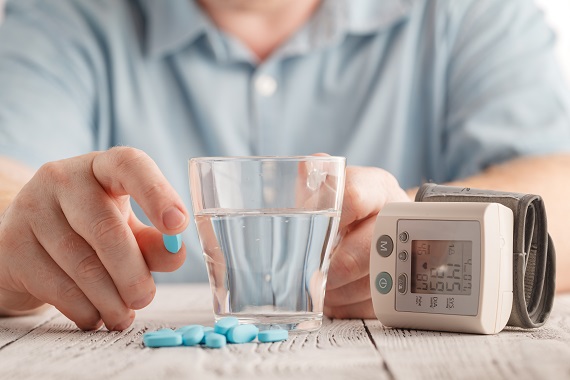Lowering blood pressure in people with high blood pressure (hypertension) helps to prevent strokes and heart attacks. Our research has helped doctors around the world understand more about who can benefit from this and what the best treatments are.
Treating high blood pressure in the over 80s
While the benefits of blood pressure lowering drugs have been understood for decades, until 15 years ago it was unclear whether it was safe to treat high blood pressure in people aged over 80. There were concerns that the risk of side effects of treatment might outweigh any benefits. There was also a lack of evidence, as most previous studies of these drugs had not included the over-80s.
To answer this question, the BHF part funded the HYVET trial, led by Professor Christopher Bulpitt at Imperial College London. The trial began in 2000 and was carried out in 13 countries in Europe, China, Australasia and North Africa. More than 3,500 people in their 80s or 90s with high blood pressure were randomly assigned to either take blood pressure lowering drugs or a placebo (a dummy pill). The HYVET trial was stopped early in 2007 when an analysis of the data up to that stage showed that the people receiving blood pressure medication had significantly lower death rates, and a reduction in the rate of stroke and heart failure. Importantly, this age group seem to tolerate blood pressure drugs well.
With life expectancy increasing, it is predicted that hypertension will become a growing health problem. This study has helped to shape guidelines for doctors in the UK and worldwide.
Other ways to improve high blood pressure treatment
While HYVET answered the question of whether to treat hypertension in people aged over 80, there were still unanswered questions about the best forms of treatment overall.
BHF-funded research led by Professor Morris Brown, then at the University of Cambridge, has been instrumental in providing evidence to develop a treatment plan for high blood pressure called the AB/CD rule, still used today to help clinicians decide which drugs to choose to control high blood pressure. To refine this guidance further, Professor Brown, together with researchers from around the UK designed the PATHWAY studies, carried out between 2009 and 2014. Without the BHF, this research might never have happened. The drugs tested in these studies were old enough to be off-patent, meaning that they wouldn’t make much money for drug companies so there was little hope of them funding the trials. The BHF stepped in and funded these important studies with a large grant of £1.9 million.
PATHWAY-1 focused on people newly diagnosed with high blood pressure, testing if it is better to start patients on a combination of blood pressure-lowering drugs rather than starting with one drug and adding more as required. It showed that both strategies could achieve similar blood pressure reduction, but people who started on a single drug took longer to reduce their blood pressure compared with those receiving a combination. And it found that people taking multiple medications did not experience more side effects.
PATHWAY-2 tested the best “add-on” treatment for people with uncontrolled high blood pressure who were already on high doses of all three of the recommended types of blood pressure medication. The trial found that a cheap diuretic (water tablet) called spironolactone was by far the most effective “add-on” medication for these people.
Diuretics remove fluid from your body (as urine), and a side effect of some diuretics is to cause potassium to be lost along with the fluid. This may increase the risk of developing diabetes, which means your blood sugar (glucose) is too high. So PATHWAY-3 explored whether using a ‘potassium-sparing’ diuretic, which does not have this effect, could benefit people with high blood pressure. The study showed that a combination of two diuretics – one that does lead to potassium loss, and one that doesn’t – was more effective at reducing high blood pressure compared with either drug alone. People who were taking this combination did not seem to have any issues with their blood sugar levels, which suggested that it could reduce the diabetes risk associated with some diuretics.
This series of studies have led to changes to several guidelines for treating high blood pressure in the UK, Europe and the USA.
Finding out the best time of day to take blood pressure lowering drugs
People with high blood pressure are often prescribed a daily tablet to help lower their blood pressure. Most people tend to take their medicine in the morning; however, there has been some evidence that taking blood pressure tablets in the evening may be more effective, but further conclusive evidence was needed.
Led by Professor Tom MacDonald at the University of Dundee, the BHF-funded Treatment In the Morning versus Evening (TIME) trial aimed to definitively test whether the time of day blood pressure medication is taken impacts how well it works to prevent cardiovascular events such as a stroke or heart attack. The trial involved over 20,000 people taking at least one medication to lower their blood pressure. Half were asked to take their medication in the evening and the other half were asked to take it in the morning.
The trial found that blood pressure medication was equally effective at helping to prevent heart attack, stroke and vascular death whether it was taken in the morning or evening.
The results of this study mean that the many people taking these medications can be confident that they are helping to protect their health, whatever time of day works best for them to take their tablets.
Last updated 20th February 2023





